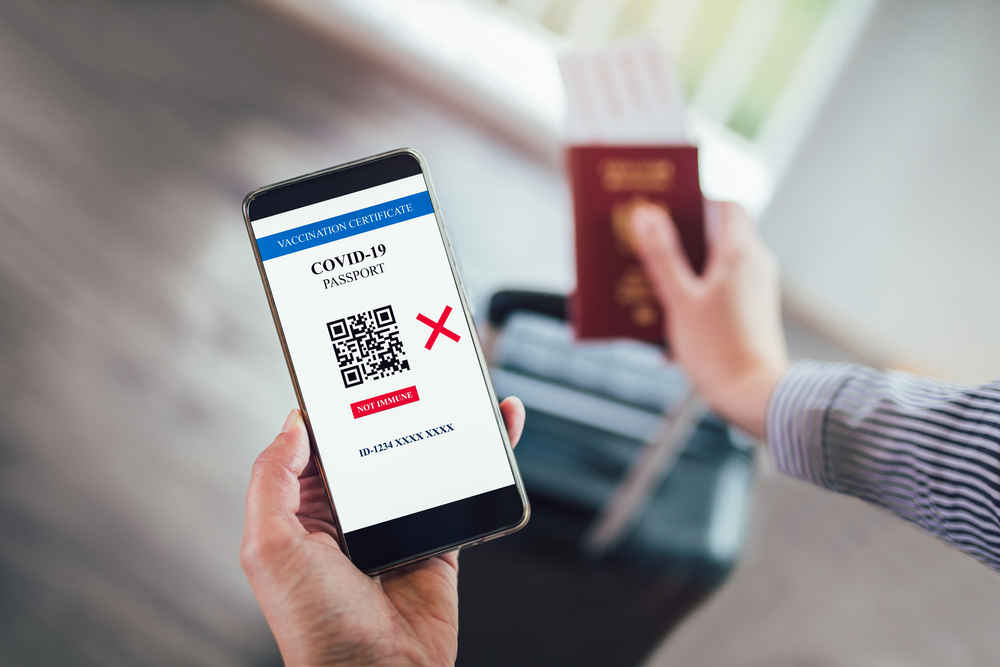At present, COVID vaccine passport rollouts cannot be not justified as the risks do not outweigh the benefits, according to an interim report by the UK-based Ada Lovelace Institute.
“The expert group came to the view that, at present, vaccination status does not offer clear or conclusive evidence about any individual’s risk to others via transmission” — Ada Lovelace Institute Interim Report
Having crowdsourced evidence from industry and policy experts, the British think tank arrived at the same conclusion as the World Health Organization — that presently, State actors should not move forward with COVID vaccine passport rollouts due to a lack of conclusive evidence regarding the efficacy of vaccination in reducing transmission.
“The expert group came to the view that, at present, vaccination status does not offer clear or conclusive evidence about any individual’s risk to others via transmission,” the Ada Lovelace Institute interim report reads.
“Without that, it cannot be a robust basis for risk-based decision making, and therefore any roll out of a digital passport is not currently justified.”
“It is likely that SARS-CoV-2 will become endemic, like seasonal flu […] at which point it will no longer require the emergency and intrusive measures justified by its present transmissibility and fatality” — Ada Lovelace Institute Interim Report
However, beyond the unknowns surrounding vaccine and transmission risks, the group of experts were concerned that COVID vaccine passports could become long-term fixtures well-after emergency measures subside.
“It is likely that SARS-CoV-2 (the virus that causes COVID-19) will become endemic, like seasonal flu and other infectious disease-causing pathogens (or even better contained, like measles, or even eliminated), at which point it will no longer require the emergency and intrusive measures justified by its present transmissibility and fatality.
“Accepting this as a reasonable scientific expectation for the near future, raises concerns about the longevity of emergency apparatus, and that such infrastructure – once built – will not be stripped back.”
Today, the @AdaLovelaceInst publishes the findings and recommendations of a rapid expert deliberation, chaired by @Prof_JonMont, which considers the risks and benefits of the potential roll-out of digital #vaccinepassports.
Read it here: https://t.co/kMyZZchoLd
1/8 pic.twitter.com/XTzlsy55Rx— Ada Lovelace Institute (@AdaLovelaceInst) February 17, 2021
One of the biggest worries coming out of the interim report was that COVID vaccine passports could merge with wider digital identity schemes as part of a broader emergency infrastructure that relies on long-term health surveillance.
“The wider merits of digital identity systems must be disaggregated from the immediate health context” — Ada Lovelace Institute Interim Report
“There were particular concerns in the expert group that digital identity systems could be introduced as part of an emergency infrastructure, but used for different or expanded purposes.”
Therefore, the experts argue that if COVID vaccine passports were to be rolled out in the UK, they should not be attached to a wider digital identity scheme.
“The wider merits of digital identity systems (for example) must be disaggregated from the immediate health context and considered in their own right.”
Additionally, “Access to digital technology, forms of identification, tests and vaccines is already unequal, and vaccine passports may unintentionally mirror and reinforce existing inequalities without wider programs for addressing health inequalities.”
“Even with the most privacy-preserving technology, the expectation is that health data will be viewed by different actors, from healthcare settings, employers, clients, police and pubs to insurance companies, who may have different levels of experience and trustworthiness in handling personal data” — Ada Lovelace Institute Interim Report
And if the coronavirus does indeed become endemic like the seasonal flu, then the health surveillance and data collection could remain in place for years to come, and the data would likely to flow to third-parties with varying degrees of trustworthiness.
“Concerns were raised about how information might be used more broadly than was intended. Information might flow to third parties, and personal data may be repurposed.
“Even with the most privacy-preserving technology, the expectation is that health data will be viewed by different actors, from healthcare settings, employers, clients, police and pubs to insurance companies, who may have different levels of experience and trustworthiness in handling personal data.”
“While vaccine passports will be seen by some as a way to increase freedom, for those without a passport they would constitute a denial of liberties that others are being granted” — Ada Lovelace Institute Interim Report
Despite all the risks, the report laid out several societal benefits of COVID vaccine passports, such as improving public health and providing some freedom of mobility, as well as supporting certain industries and the wider economy.
However, “While vaccine passports will be seen by some as a way to increase freedom, for those without a passport they would constitute a denial of liberties that others are being granted.”
As a matter of ethics, many governments cannot force their citizens to get vaccinated, but there is growing concern that COVID vaccine passports could become a backdoor to the rule in that citizens would be coerced into getting the jab by being denied access to essential goods and services if they opt-out.
“There were particular concerns in the expert group that digital identity systems could be introduced as part of an emergency infrastructure, but used for different or expanded purposes” — Ada Lovelace Institute Interim Report
“It has been argued that one of the benefits of vaccine passports is to encourage uptake of COVID-19 vaccines,” the report reads.
“However, there is a downside risk that it could reduce trust and increase vaccine hesitancy if the scheme is seen as introducing mandatory vaccination by the back door.”
The Ada Lovelace Institute highlighted many risks and benefits in its interim report, along with several recommendations for the British government to consider.
In the end, the experts agreed that COVID vaccine passport rollouts were too risky at present, but they came to the consensus that some form of vaccination certification would be inevitable.
“While some experts felt any form of digital vaccine passport could not be justified due to the risks they pose, the expectation from the group is that some form of vaccination certification will emerge, and therefore that general prohibition is neither desirable nor achievable.”
COVID-19 data collection poses post 9/11 privacy abuse risks: CNAS, DataGovHub panel












